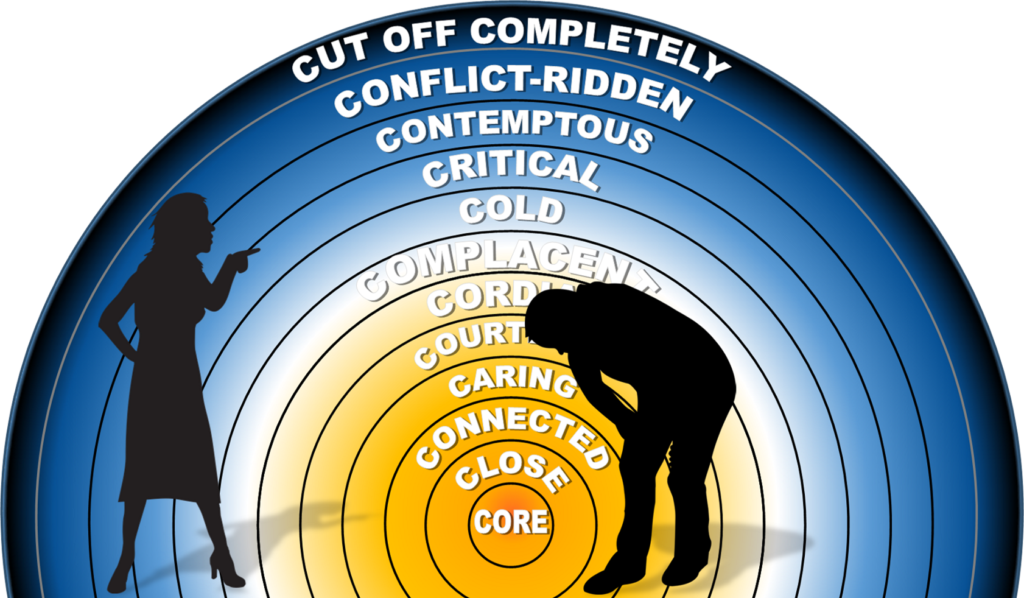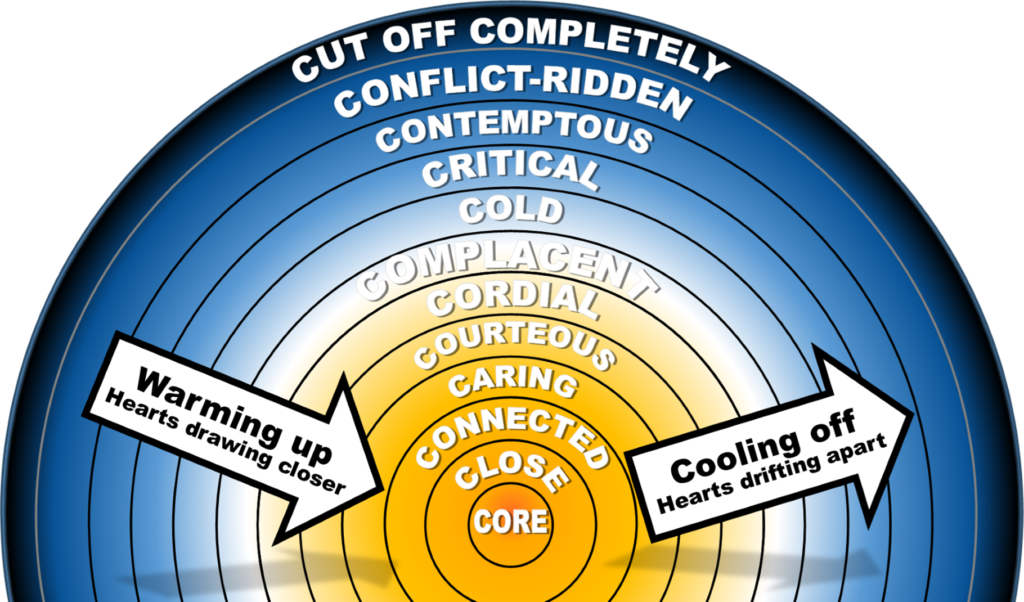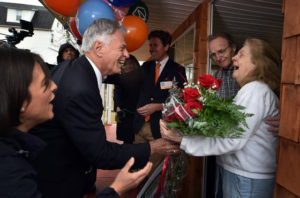
In my first post, I introduced the concept of relational temperatures and listed things that will cause relationships to either warm up or cool off.
It’s wonderful when families and friendships are close, but it’s painful when we feel kept at a distance by those we long to be close to. This post explores ways to respond when others continue to treat us coldly, despite our efforts at warmth.
Grieve. God created us for warm connections, so when those we care about treat us with coldness, grief is inevitable. This grief involves not only the distancing of the person, but also the diminished relationship itself. Additional losses may include accessibility, trust, enjoyment, support, peace, safety, security, harmony, respect, love, and delight. Such great losses inevitably bring along the various stages of grief: denial, anger, bartering, and depression. Working through these is important.
Accept. The final stage of grief is acceptance. This does not mean throwing in the towel and giving up on the relationship, but it does mean accepting that the other person has chosen to remain cold toward us. Acceptance recognizes that we can’t control the choices of others. We can only take responsibility for ourselves.
Move from Madness to Sadness. When others choose to relate to us with coldness, criticism, contempt, etc., it is deeply hurtful. And the more we care about the relationship, the more their coldness hurts. They have likely treated us in ways that seem unfair, unreasonable, unappreciative, demeaning, and insulting. Anger is understandable and probably unavoidable. Yet we can’t stay there. Harboring bitterness only hurts ourselves, the other person, and whatever remains of the relationship. In our hearts, we must work toward letting go of our anger and forgiving people for the hurt they caused. Our goal is to move from Madness to Sadness. We mustn’t remain mad, but it’s ok to remain sad–in fact, our sadness will be a beautiful testimonial to how much the relationship means to us.
Get Support. It will be impossible to do any of this on our own—we need support! We must take it first to Jesus, who understands more than anyone what it feels like to receive iciness in response to His warm love. He is the one who can bring us comfort in our grief, who can help us accept what we can’t control, who can give us the willingness and ability to forgive, and who can give us the power to change our Madness to Sadness. We’ll also need peer support. Let’s lean on others during our time of hurt to receive needed prayer, encouragement, perspective, wisdom, and guidance. God instructed His Church to practice the “one anothers” for needs such as ours in times such as this. The warmth offered by Jesus and His Church is sure to offset much of the cold treatment we’ve been receiving.
Keep Our Wants and Needs Straight. We cause ourselves needless additional pain when we confuse our needs and our wants. Think of the weight that would be lifted if we viewed getting warmth from others as a want, but not a need. Consider these scenarios…
- The mom who needs her daughter to call on Mother’s Day will be shattered when she doesn’t, whereas the mom who merely wants that won’t let her daughter’s negligence define her worth or ruin her day.
- The son who needs his parents to visit him as often as they visit the other siblings will be infuriated when they don’t, whereas the son who merely wants equal time will have a gentler response to the unfairness.
- The wife who needs her husband to compliment her will be crushed, whereas the one who only wants his compliments will be hurt, but not let it define her well-being.
- The sister who needs her brother to enthusiastically help plan their parents’ 50th anniversary will be incensed when he shows disinterest. The one who merely wants that will have a more tempered response to him as she honors her parents without him.
- The friend who needs her former boyfriend to respond to communications will be absolutely wrecked by his ghosting, but the one who only wants a response will be able to recover.
So let’s be careful about what category we place things into. Unmet needs seem catastrophic, make us feel desperate, and cause us to panic. Unmet wants may be unpleasant, but can be overcome far more easily. (Technically, I believe we don’t need anything from anyone, but that’s beyond today’s topic!)
Don’t Give Up Hope. Earlier we talked about accepting the other’s choice to treat us coldly, but that doesn’t mean we can’t hope for a warmer future. Below are some suggestions for practical things we can do that may increase the chances of the other person warming up to us.
[Disclaimer, it’s important to acknowledge that some relationships are abusive and need boundaries rather than increased warmth. In extreme cases, remaining cut off completely may be the only healthy response while abusive behavior persists.]
Pray. Most “coldness” issues are matters of the heart, so asking God to change the heart of the cold person is essential. Let’s be sure to pray “for” the person and not “against” him or her. If our loved ones have cut us off completely or are unsafe to be around, prayer for them may literally be our only option. Where we do have contact, let’s pray also for ourselves, that we’ll avoid the temptation to return coldness for coldness. Let’s pray that somehow, in some way, we’ll be able to build a relational bridge to the person’s heart.
Apologize. When in doubt, let’s apologize! Let’s take responsibility for anything we perceive we may have done to contribute to the coldness between us, and offer a heartfelt apology. Let’s also ask them if there’s anything else we missed–other things we need to make right. Let’s listen carefully and take full responsibility for every hurt we caused without resorting to defensiveness, blame-shifting, deflection, or excuse-making.
Hide Our Hurt. Even though we have certainly been wounded by those who treat us coldly, let’s not share this with them unless they ask. Let’s be especially careful not to complain, pout, sulk, act wounded, play the victim, or call them out. Scolding willfully-cold people for treating us coldly will surely result in further coldness. This is an occasion when honesty is not the best policy. No, I am not suggesting we stuff our feelings. The hurts do need to be expressed, but that’s why we have a support team in place!
Express Our Desire. Sometimes, it can help just to state what we’d like. We can describe to them what we liked when things were warmer between us, sharing cherished memories of former times. We can express how we long to get back to that place of warmth again if possible. Let’s paint a picture of an improved future and express our commitment to doing whatever we can to get there if possible. But if we do so, let’s be careful to avoid shaming, pressuring, sermonizing, and manipulating. Let’s allow them the freedom to disagree.
Continue to Act Warmly Even to Those Who Remain Cold. Jesus loved us when we were still his enemies, so when we act warmly to those who continue to treat us coldly, we are being like Him. We all give account for ourselves, not for anyone else. They will answer for their actions and so will we. When others are cold to us, let’s always choose to be the warmer person, the bigger person, the godlier person. It’s the right thing to do.
In Part 3 on this topic, I will define my chart’s various temperature levels and suggest practical ways to make warm relationships even warmer.
_________________________________________________________________________________________
Subscribe to my blog to receive notifications when I post.
[subscribe2]
 This essay runs parallel with my two previous “never say” posts: Never say “I’m Sorry,” and Never say “Trust me.”
This essay runs parallel with my two previous “never say” posts: Never say “I’m Sorry,” and Never say “Trust me.”





 I’ve always admired those people who can read through the Bible each year. I once met an elderly saint, who shared with me — shortly before his death — that he had read through the Bible something like 50 times over his lifetime. Wow! He has been a spiritual mentor to me, teaching me more about intimacy with God than anyone else. In many ways, I want to be just like him.
I’ve always admired those people who can read through the Bible each year. I once met an elderly saint, who shared with me — shortly before his death — that he had read through the Bible something like 50 times over his lifetime. Wow! He has been a spiritual mentor to me, teaching me more about intimacy with God than anyone else. In many ways, I want to be just like him. My mind raced back to Publishers Clearinghouse Sweepstakes commercials I had seen as a kid, where the TV “Prize Patrol” would arrive at the doorsteps of unsuspecting residents to announce that they had just won a million dollars. It was always fun to watch the family go bananas over this totally unexpected news: jumping, screaming, speechlessness, dancing, laughing, falling to their knees, etc. Just like the people in church on Sunday. Outlandish. Over-the-top. Undignified even.
My mind raced back to Publishers Clearinghouse Sweepstakes commercials I had seen as a kid, where the TV “Prize Patrol” would arrive at the doorsteps of unsuspecting residents to announce that they had just won a million dollars. It was always fun to watch the family go bananas over this totally unexpected news: jumping, screaming, speechlessness, dancing, laughing, falling to their knees, etc. Just like the people in church on Sunday. Outlandish. Over-the-top. Undignified even.